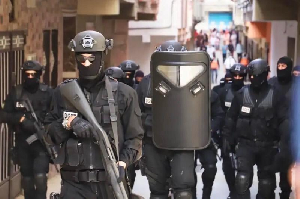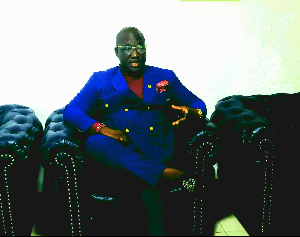Diasporia News of Tuesday, 6 March 2012
Source: --
Ghana's Ambassador to Korea On Independence Day
The following is an official message by Ghana’s Ambassador to Korea Margaret Clarke-Kwesie on the occasion of the 55th anniversary of the West African nation’s independence from British colonial rule. — ED.
Today, March 6, marks the 55th Independence Anniversary of the Republic of Ghana. Formed from the merger of the British Colony of the Gold Coast and the Togoland trust territory, Ghana in 1957 became the first sub-Saharan country in colonial Africa to gain its independence.
On the eve of Ghana’s independence, Osagyefo Dr. Kwame Nkrumah, the first prime minister and president proclaimed at the old polo grounds in Accra “At long last, the battle has ended and Ghana, our beloved country is free forever”.
Ghana spearheaded the political liberation of colonized Africa from the very first day of her independence. Dr. Nkrumah championed the cause of African unity which led to the formation of the Organisation of African Unity (OAU), now the African Union (AU). Ghana became a sovereign member of the United Nations, the Commonwealth and the Non-aligned Movement and ECOWAS.
However, from 1966-1981, a series of coup d’etats interspersed with short periods of democratic rule plagued the country and undermined its development process. Since 1992 however, when Ghanaians voted in a referendum to follow a multiparty democratic rule, Ghana has had four successful and peaceful general elections with three successive changes in the Government. Another election is scheduled to take place in December, 2012. It is hoped that there shall be successful and peaceful elections.
Ghana’s economy has been strengthened by a quarter century of relatively sound management, a competitive business environment and sustained reduction of poverty levels.
Oil production of Ghana’s offshore jubilee field began in mid-December, 2010 and is expected to boost economic growth. Estimated oil reserves have jumped to almost 700 million barrels.
From 1994 to last year, Korean companies invested $61 million into the Ghanaian economy. Ghana is officially recognized by the World Bank as the easiest place to do business in West Africa.
Besides, the country is politically stable with comparative advantage in terms of tax relief. There is personal safety and security for people who live in Ghana which is very high compared to other African countries.
Sound macroeconomic management along with high prices for gold and cocoa helped sustain GDP growth in 2008-2011. Coupled with its expanding oil and gas sector, and Ghana is expected to grow at 11 percent this year. Ghana is the second fastest growing economy in the world after Qatar, according to the World Bank.
Last year, the country’s tourism sector attracted US$800 million revenue and about a million tourists visited Ghana.
Well preserved rainforests including Kakum National Park with its canopy walkway, there is also Nzulezu, a village built on stilts in the middle of a lagoon. The Shai Hills Reserve home to baboons, parrots and antelopes, is located a short distance from Accra. Tourist can tour the reserve on horseback. Nearby is also the Wli Falls in the Agumatsa Wildlife Sanctuary. There are many wetlands in this area home to many birds. There are also many international level hotels and restaurants as well as an international airport in Accra
The relations between Ghana and South Korea have grown steadily since the two countries first established diplomatic relations in 1977.
Since the appointment of Margaret Clarke-Kwesie as Ghana’s Ambassador to Korea in 2009, various initiatives have been undertaken toward strengthening the existing warm bilateral relations and the enhancement of political, economic and technical cooperation between the two countries.
Korea has become increasingly attractive to Ghana both as a source of Foreign Direct Investment (FDI), technological transfers, knowledge sharing and expertise. This makes significant contributions toward our ongoing economic development. In Korea, Ghana is better known for its chocolate and soccer than its investment opportunities but the landscape has changed.
Korea grants to Ghana has enabled the country to provide goods and services to key sectors of the economy such as transport, agriculture, health and e-Administration for MDAs to improve efficiency and productivity of the public sector. This support come in the form of vehicles, water pumps, bicycles, machinery and office equipment. Also through AFKO, a private Korean company, Koreans have been active in the country’s fishing industry. In addition, Ghanaian farmers have benefited from the training given by Korean experts in modern farming techniques particularly in high yielding rice cultivation at Asutware.
Furthermore, Korean government had through Korea International Cooperation (KOICA) provided training opportunities to Ghanaian farmers, teachers and public officers. Presently there are about 35 Ghanaians pursuing undergraduate and graduate level programs in various Korean institutions.
The volume of trade between Korea and Ghana is relatively small and the balance is in favor of Korea. The average annual volume of export trade for a ten year period (2001-2011) from Korea to Ghana totaled $1,494,466.










